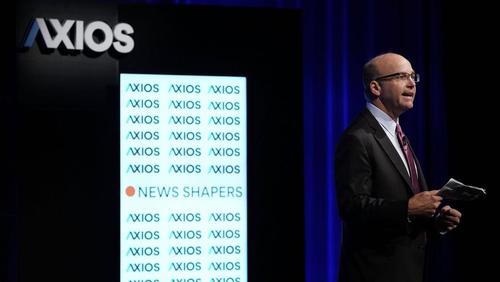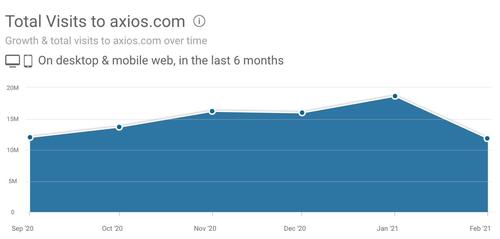Axios Joins Buzzfeed In Pursuing SPAC Deal As Traffic Shrinks In Post-Trump Era
Axios, a privately held digital-media startup launched by former Politico journalists that made a name for itself during the Trump era for firing off rapid fire scoops (while occasionally demonstrating lax standards for rumors and hearsay), has become the latest big-name firm in the bombed-out media space to consider going public via SPAC.
Over the last year, headlines in the digital-media world have been pretty grim. Bustle, Vox, Group Nine, Buzzfeed (which acquired the Huffington Post, only to fire one-third of its staff) Vice and others have announced layoffs and cutbacks, and all have been rumored to be in talks about potentially going public via SPAC.
At this point in the cycle, the venture capitalists who eagerly backed these firms 8 years ago are probably now panicking about getting their money out. Some might interpret the fact that SPACs are trawling for media deals, especially now that President Trump is living a mostly quiet life in Palm Beach, as a sign that there are few attractive opportunities left in the market, and wanna be dealmakers are now scraping the bottom of the barrel.
But what makes all this even more entertaining is the fact that Axios has reported on the SPAC boom. Some of this reporting has been critical. Other, more recent reports, have been conspicuously credulous.
Here’s Axios in a piece entitled “Why fears of a SPAC bubble may be overblown” published on March 4:
Reasons for (relative) calm: Unlike traditional venture capital or equities investing, though, SPACs have numerous guardrails.
Some of them are structural. Redemption rights, IPO proceeds held in escrow via T-bills and the ability for unit-holders to rebuff a merger.
There also is pricing pressure from the small number of institutional investors that have come to dominate the PIPE market. For example, it’s not uncommon for a SPAC to win a bake-off by offering the highest price, only to renegotiate down after the letter of intent is signed. Not because the SPAC sponsor thinks it over-bid, but because the big PIPE players do.
“Target companies hate when this happens, but they’re in an exclusivity period once they’ve signed the LOI, so their only option is to negotiate or wait a while and start the whole thing over,” a SPAC banker explains.
Make of that what you will.
According to a report in the WSJ, the deal being discussed would have Axios merge with increasingly popular subscription-based sports website “the Athletic” in order to pursue a range of expansion options that could very possibly include a SPAC deal. While the decisions are reportedly “at an early stage” and “could fall apart”, one of the most salient characteristics of the SPAC boom is how quickly parties go from “just talking” to inking the deal and bringing in institutional money to inject even more capital via what’s known as a “PIPE”.
The business plan being bandied about would focus on selling premium subscription models, mostly to businesses and professionals.
Axios and the Athletic believe one potential growth area is selling subscriptions to businesses at a premium rate, according to the people familiar with the investor presentation. Mr. VandeHei and one of his co-founders, Axios President Roy Schwartz, helped create Politico Pro, a business-to-business publication, when they both worked at Politico.
One logical step to raise capital could be going public by merging with a blank-check company, also known as a special-purpose acquisition company, the people said. There are also other options under consideration, one of the people said, declining to be more specific. Subscriptions have been a focus of writers who have migrated to substack, patreon or other platforms catering to independent creators. But only a few major news media companies have been able to work, and even then only barely.
Axios’s own traffic has fallen since peaking right around the end of President Trump’s dramatic exit from office, falling 36% in February, according to data from SimilarWeb.
In a piece published just yesterday, Fox News pointed out that traffic at many major leftist news outlets including the NYT and Washington Post has fallen since Trump left office. What’s more, all companies that sell digital ads took a hit when ad rates cratered during the pandemic.
At this point, is the fact that we haven’t seen more digital media SPAC deals a sign that, without Trump, these businesses are so screwed that even SPAC dealmakers are squeamish?
Tyler Durden
Fri, 03/26/2021 – 17:20
via ZeroHedge News https://ift.tt/3u0nN5w Tyler Durden

